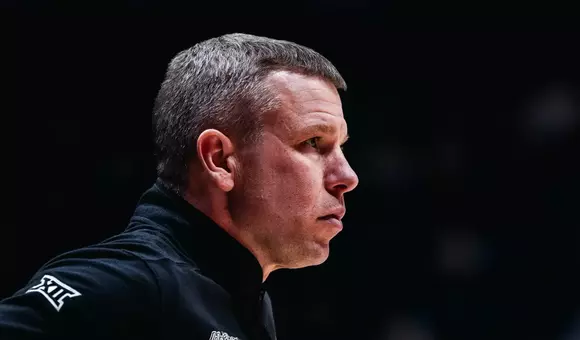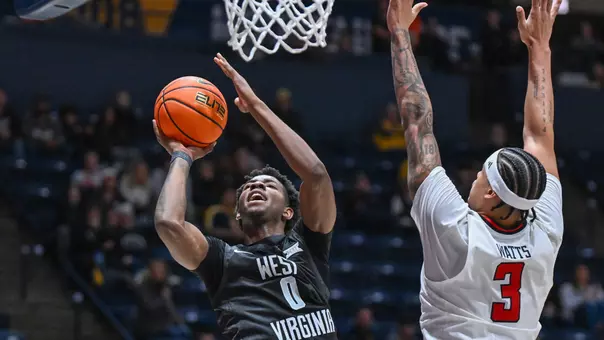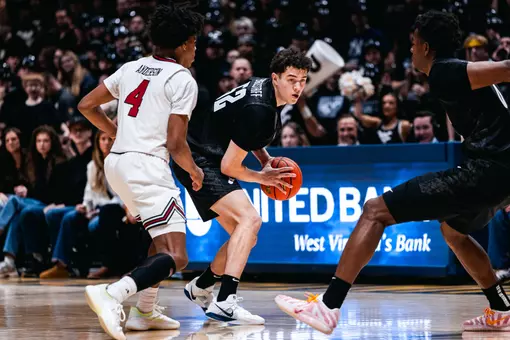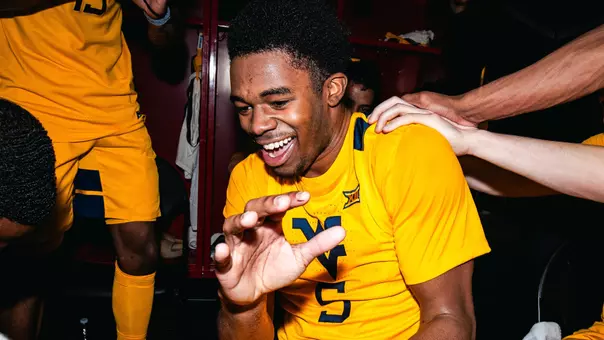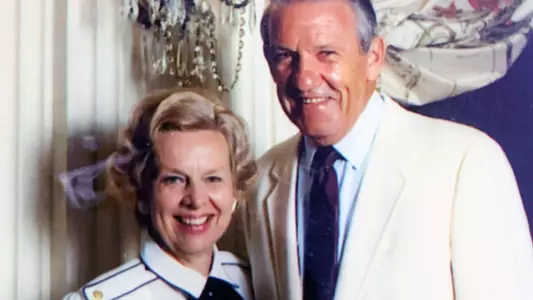
Photo by: Submitted photo
NCAA Snubs Nothing New to West Virginia Basketball
March 18, 2025 11:05 AM | Men's Basketball
MORGANTOWN, W.Va. – The fellas on the popular "3 Guys Before the Game" podcast on Monday called West Virginia's recent NCAA Tournament snubbing "an all-time, all-timer," and it's hard to disagree with them.
What happened to the Mountaineers on Selection Sunday is baffling to folks from all parts of the country.
Do a Google search for "West Virginia", "NCAA Tournament" and "Snub" and you will be scrolling for a while.
In the Mountain State, feelings of disappointment, disgust, anger and rage have overtaken message boards, social media pages and sports columns.
WVU director of athletics Wren Baker has already issued two statements expressing his disappointment in the NCAA Tournament Selection Committee and was a guest on Tony Caridi's "Sportsline" radio show yesterday evening.
You can listen to a replay of that show here (https://wvmetronews.com/podcast/sportsline/).
West Virginia has been on the wrong side of the NCAA Tournament bubble in the past, but never quite to this degree.
Coach John Beilein's Mountaineers had a mild case of disappointment in 2007 when they won 22 games before the tournament, including a home victory over second-ranked UCLA (without its star player Darren Collison). But the Mountaineers played a weak nonconference schedule that included Division II Slippery Rock and posted just a 5-8 record versus top-100 teams.
WVU's RPI of 58 also put it in a tenuous place.
Even West Virginia's No. 1 seeding in the NIT was questioned, considering Syracuse and Florida State had more top-25 wins, and Kansas State also had 22 victories playing in the Big 12 Conference.
However, West Virginia eventually proved its worthiness by winning the NIT.
In 1997, the Mountaineers had an 11-7 regular season record in the Big East and 19 victories before falling to Providence in the Big East Tournament quarterfinals.
Immediately after the loss, Mountaineer coach Gale Catlett began lobbying for his team during his postgame remarks by denigrating the accomplishments of the conference's other bubble teams - Providence, Georgetown and Syracuse.
The Big East had a down year, with only four tournament participants: Boston College, Villanova, Georgetown and Providence.
The question the selection committee had was if a fifth Big East team deserved a bid. West Virginia, with an RPI of 38, felt it did, as did 19-win Syracuse, but the committee balked and instead picked 17-win Purdue and 17-win USC.
It was the first time in Big East history teams with credentials of 19 overall wins and at least 11 conference victories didn't make it into the NCAA Tournament.
Catlett had another beef in 1985 when his Mountaineers won the Atlantic 10 regular season title with a 16-2 record and a 20-8 overall mark before being upset by Duquesne in the A-10 quarterfinals in Piscataway, New Jersey.
Teams picked ahead of West Virginia for the Dance that year included 16-12 Kentucky, 17-11 Pitt, 18-10 Boston College and 19-11 Old Dominion.
What makes that snubbing relevant to this year was the fact that Catlett's athletic director, Fred Schaus, was on the NCAA Tournament Selection Committee.
Despite this, Catlett let loose on the committee and his boss!
"When you win the regular season championship with a 16-2 record in a conference ranked as the eighth-toughest in the country by Basketball Weekly, you win eight of our last nine games, 16 of your last 19 and play in the 11th-toughest nonconference schedule in the country ranked by NCAA News last week," he wrote in a statement released to the media, adding "… you win 20 games and participate in the last three NCAA Tournaments and not get a bid, then the NCAA's selection committee has made a tremendous error."
Unfortunately for WVU, some of the competing data points Schaus and the other committee members, led by its chair Cedric Dempsey, used to consider the Mountaineers' case were not as flattering.
West Virginia lost to the A-10's No. 8 seed Duquesne in the quarterfinals, and a 4-5 record outside of conference play included victories over non-Division I Indiana (Pa.) and Ohio Wesleyan, not to mention a 19-point loss at Pitt, the final team to get into the recently expanded field of 64.
The Mountaineers' 52 RPI was 16 spots better than Iowa State's 68, but the Cyclones had a much more difficult strength-of-schedule rating than West Virginia's 112.
So, in the end, West Virginians upset that their team didn't get into the tournament could also see the logic put forth by their athletic director, who understood optics, public opinion and trust.
As an aside, Schaus was overseeing a chronically cashed-strapped WVU athletic department that was coming off a major budgetary crisis, and he could have used the extra money that an NCAA Tournament bid would have brought to his school.
"Naturally, we're disappointed," Schaus said a day after the committee's work was completed. "There are a lot of schools that are happy and a lot of unhappy schools. Our committee met for 3½ days, 17 hours alone on Saturday, and I think we came up with an excellent field."
An excellent field that did not include the university that employed him!
That was the first thing that popped into my mind soon after the bracket was unveiled during Sunday's NCAA Tournament Selection Show televised on CBS.
Then, I thought about it some more when the committee chair and vice-chair came on television to explain their reasoning for the teams that they selected, and the teams they didn't.
I'm getting old, for sure, but man, do I miss guys like Fred Schaus.
If ever there was a time when college sports needed more men (or women) like Fred Schaus, it's right now!
What happened to the Mountaineers on Selection Sunday is baffling to folks from all parts of the country.
Do a Google search for "West Virginia", "NCAA Tournament" and "Snub" and you will be scrolling for a while.
In the Mountain State, feelings of disappointment, disgust, anger and rage have overtaken message boards, social media pages and sports columns.
WVU director of athletics Wren Baker has already issued two statements expressing his disappointment in the NCAA Tournament Selection Committee and was a guest on Tony Caridi's "Sportsline" radio show yesterday evening.
You can listen to a replay of that show here (https://wvmetronews.com/podcast/sportsline/).
West Virginia has been on the wrong side of the NCAA Tournament bubble in the past, but never quite to this degree.
Coach John Beilein's Mountaineers had a mild case of disappointment in 2007 when they won 22 games before the tournament, including a home victory over second-ranked UCLA (without its star player Darren Collison). But the Mountaineers played a weak nonconference schedule that included Division II Slippery Rock and posted just a 5-8 record versus top-100 teams.
WVU's RPI of 58 also put it in a tenuous place.
Even West Virginia's No. 1 seeding in the NIT was questioned, considering Syracuse and Florida State had more top-25 wins, and Kansas State also had 22 victories playing in the Big 12 Conference.
However, West Virginia eventually proved its worthiness by winning the NIT.
In 1997, the Mountaineers had an 11-7 regular season record in the Big East and 19 victories before falling to Providence in the Big East Tournament quarterfinals.
Immediately after the loss, Mountaineer coach Gale Catlett began lobbying for his team during his postgame remarks by denigrating the accomplishments of the conference's other bubble teams - Providence, Georgetown and Syracuse.
The Big East had a down year, with only four tournament participants: Boston College, Villanova, Georgetown and Providence.
The question the selection committee had was if a fifth Big East team deserved a bid. West Virginia, with an RPI of 38, felt it did, as did 19-win Syracuse, but the committee balked and instead picked 17-win Purdue and 17-win USC.
It was the first time in Big East history teams with credentials of 19 overall wins and at least 11 conference victories didn't make it into the NCAA Tournament.
Catlett had another beef in 1985 when his Mountaineers won the Atlantic 10 regular season title with a 16-2 record and a 20-8 overall mark before being upset by Duquesne in the A-10 quarterfinals in Piscataway, New Jersey.
Teams picked ahead of West Virginia for the Dance that year included 16-12 Kentucky, 17-11 Pitt, 18-10 Boston College and 19-11 Old Dominion.
What makes that snubbing relevant to this year was the fact that Catlett's athletic director, Fred Schaus, was on the NCAA Tournament Selection Committee.
Despite this, Catlett let loose on the committee and his boss!
"When you win the regular season championship with a 16-2 record in a conference ranked as the eighth-toughest in the country by Basketball Weekly, you win eight of our last nine games, 16 of your last 19 and play in the 11th-toughest nonconference schedule in the country ranked by NCAA News last week," he wrote in a statement released to the media, adding "… you win 20 games and participate in the last three NCAA Tournaments and not get a bid, then the NCAA's selection committee has made a tremendous error."
Unfortunately for WVU, some of the competing data points Schaus and the other committee members, led by its chair Cedric Dempsey, used to consider the Mountaineers' case were not as flattering.
West Virginia lost to the A-10's No. 8 seed Duquesne in the quarterfinals, and a 4-5 record outside of conference play included victories over non-Division I Indiana (Pa.) and Ohio Wesleyan, not to mention a 19-point loss at Pitt, the final team to get into the recently expanded field of 64.
The Mountaineers' 52 RPI was 16 spots better than Iowa State's 68, but the Cyclones had a much more difficult strength-of-schedule rating than West Virginia's 112.
So, in the end, West Virginians upset that their team didn't get into the tournament could also see the logic put forth by their athletic director, who understood optics, public opinion and trust.
As an aside, Schaus was overseeing a chronically cashed-strapped WVU athletic department that was coming off a major budgetary crisis, and he could have used the extra money that an NCAA Tournament bid would have brought to his school.
"Naturally, we're disappointed," Schaus said a day after the committee's work was completed. "There are a lot of schools that are happy and a lot of unhappy schools. Our committee met for 3½ days, 17 hours alone on Saturday, and I think we came up with an excellent field."
An excellent field that did not include the university that employed him!
That was the first thing that popped into my mind soon after the bracket was unveiled during Sunday's NCAA Tournament Selection Show televised on CBS.
Then, I thought about it some more when the committee chair and vice-chair came on television to explain their reasoning for the teams that they selected, and the teams they didn't.
I'm getting old, for sure, but man, do I miss guys like Fred Schaus.
If ever there was a time when college sports needed more men (or women) like Fred Schaus, it's right now!
United Bank Playbook: UCF Preview
Friday, February 13
Ross Hodge | UCF Preview
Thursday, February 12
Ross Hodge | Texas Tech Postgame
Sunday, February 08
Brenen Lorient & Harlan Obioha | Texas Tech Postgame
Sunday, February 08
